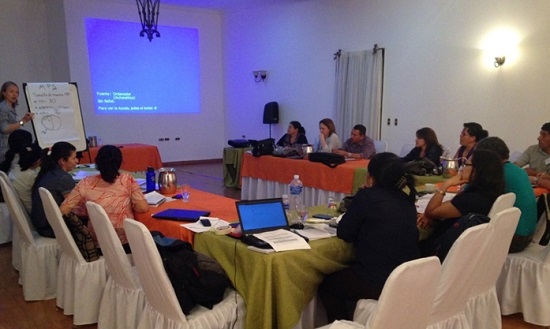
 In April 2012, Honduras was the first country in the Region of the Americas to launch a Strategic Plan to combat the burden of nine neglected infectious diseases (NIDs): Chagas disease, leishmaniasis, leprosy, rabies transmitted by dogs, leptospirosis, congenital syphilis, neonatal tetanus, soil transmitted helminthiasis (STH) and taeniasis / cysticercosis.
In April 2012, Honduras was the first country in the Region of the Americas to launch a Strategic Plan to combat the burden of nine neglected infectious diseases (NIDs): Chagas disease, leishmaniasis, leprosy, rabies transmitted by dogs, leptospirosis, congenital syphilis, neonatal tetanus, soil transmitted helminthiasis (STH) and taeniasis / cysticercosis.
Tegucigalpa, 22 June 2015 (PAHO/WHO)-In April 2012, Honduras was the first country in the Region of the Americas to launch a Strategic Plan to combat the burden of nine neglected infectious diseases (NIDs): Chagas disease, leishmaniasis, leprosy, rabies transmitted by dogs, leptospirosis, congenital syphilis, neonatal tetanus, soil transmitted helminthiasis (STH) and taeniasis / cysticercosis.
Since then, the country has intensified their control and elimination activities through the implementation of various interventions, such as national week of deworming activities against STH integrated with National Immunization Week of the Americas. Rosa Elena Mejia of the Pan American Health Organization (PAHO / WHO) highlighted that: "...The success of the deworming campaigns in our country is due to their integration with other sectors and working closely with several strategic partners. Through the leadership of the NIDs Technical Committee coordinated by the Health Secretary, with the technical support from PAHO / WHO, the country has generated a model that allows high efficiency and ensures that more children and their families receive protection against these diseases of poverty".
To monitor the progress of interventions it is essential to have coverage information with quality data. Therefore, Honduras is conducting a study that compares three survey methodologies to assess program performance, cost -effectiveness and feasibility of implementation. Before starting the collection of data, from June 16 to 18, 2015, the Health Secretary trained officials from three municipalities: Gracias and Lepaera from Lempira department and San Juan from Intibucá department. This initiative is supported by the PAHO / WHO and the NTD support Center of The Task Force for Global Health.
During the workshop Dr. Reina Teresa Velázquez, Neglected Infectious Diseases national program coordinator of the Health Secretary emphasized that: "... our commitment to control these diseases is so high that leads us to continually analyze how we can improve and reach more people ... people who need it most". In Honduras the coverage survey comparing the three methodologies will take place during the last two weeks of June and the results will enable the country to improve their strategies for providing health services to achieve universal coverage.
This study was already implemented in three countries, Malawi, Uganda and Burkina Faso, hence, the joint analysis of the results will provide information that will allow WHO to recommend to the countries the most efficient methodology for evaluating the performance of mass drug administration activities, applied to combat some of Neglected Infectious Diseases, among them the STH deworming campaigns.
With this initiative of undertaking this study, the Hondurans have demonstrated one more time that they are leaders in addressing the neglected diseases. Now, more than ever, people who live at risk of NIDs in Honduras can count on public policies and measures to ensure their protection and support for a better and healthier life.



See more: Neglected Infectious Diseases Portal



